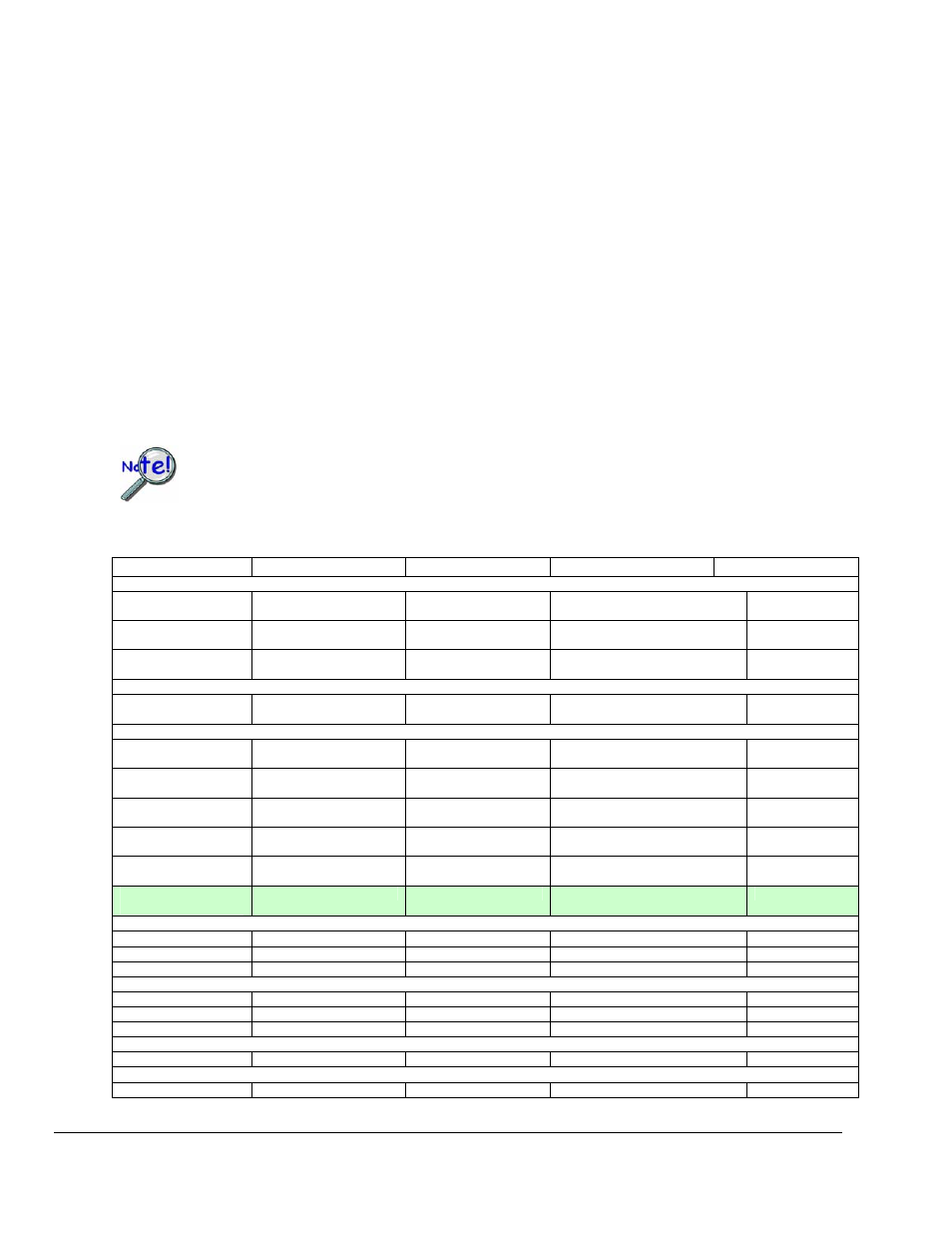Local i/o, Expansion i/o – Measurement Computing Data Acquisition Systems rev.10.4 User Manual
Page 262

Local I/O
Those devices which support the P2 port have built-in Intel 8255C chips which can be used as general purpose I/O.
The 8255C has 3 configurable digital input/output (DIO) ports (PortA, PortB, PortC). These ports are 8-bit ports
which can be individually programmed as either input or output ports. All three of the local P2 ports can be read
asynchronously using the daqIOReadBit function.
Additionally, there is a 16-bit Digital port on P3 of the main unit.* If devices allow this port to be used as a high
speed digital port which can be scanned synchronously along with other analog channels in a acquisition.
Some devices, such as the DaqBook/2000 Series, DaqLab/2000 Series, DaqScan/2000 Series, DaqBoard/2000
Series [and 2000c Series] products, can also access this port asynchronously as a general purpose DIO port. If using
the DaqBoard/2000 Series [or 2000c Series] products, the daqIORead function can be used to read this port
asynchronously.
*
Note
:
P3 for DaqBoard/2000 Series boards is obtained by connecting an appropriate DBK200 Series board to the DaqBoard/2000
Series board’s P4 connector, via cable.
Expansion I/O
There are several expansion options (DBK2x) that allow the DIO to be expanded on the main unit of the device.
These expansion units operate off of the P2 port of the main unit (if the main unit supports P2) and can be accessed
asynchronously. These expansion cards vary in numbers of DIO as well as DIO connectivity and isolation
characteristics (see the User Manual on characterstics of your particular DBK2x card). All of the DBK2x series
expansion cards can be accessed asynchronously.
When using a DBK20 Series expansion card on P2, the Local P2 port becomes inaccessible.
The following table describes typical port settings. “n” is the expansion card’s position in a system. In a three
card system the first card would have n = 0, the second card n = 1, and the third card n = 2.
Digital I/O Port
devType devPort
whichDevice
whichExpPort
P2 Local DIO ( one 8255 – three 8-bit DIO banks)
P2 Local 8255 Port A
(P2 pins 30-37)
DiodtP2Local8 DiodpP2Local8
Diodp8255A
DioepP2
P2 Local 8255 Port B
(P2 pins 3-10)
DiodtP2Local8 DiodpP2Local8
Diodp8255B
DioepP2
P2 Local 8255 Port C
(P2 pins 22-28)
DiodtP2Local8 DiodpP2Local8
Diodp8255C
DioepP2
P3 Local DIO/HS Digital IO (one 16-bit DIO bank)
P3 Local 16-bit Port*
(P3 pins 3-10, 22-29)
DiodtP3LocalDig16 DiodpP3LocalDig16
DiodpP3LocalDig16
DioepP3
P2 Expansion DIO with DBK20/21 (dual 8255’s – six 8-bit DIO banks)
“n” is the expansion card’s position in a system.
P2 Exp 8255-0 Port A
(see DBK20/21 doc)
DiodtExp8255 DiodpP2Exp8
(nx8) + Diodp8255A
DioepP2
P2 Exp 8255-0 Port B
(see DBK20/21 doc)
DiodtExp8255
DiodpP2Exp8 (nx8) + Diodp8255B
DioepP2
P2 Exp 8255-0 Port C
(see DBK20/21 doc)
DiodtExp8255
DiodpP2Exp8 (nx8) + Diodp8255C
DioepP2
P2 Exp 8255-1 Port A
(see DBK20/21 doc)
DiodtExp8255
DiodpP2Exp8 (nx8) + Diodp8255A + 4
DioepP2
P2 Exp 8255-1 Port B
(see DBK20/21 doc)
DiodtExp8255
DiodpP2Exp8 (nx8) + Diodp8255B + 4
DioepP2
P2 Exp 8255-1 Port C
(see DBK20/21 doc)
DiodtExp8255
DiodpP2Exp8
(nx8) + Diodp8255C + 4
(
see example)
DioepP2
P2 Expansion DIO with DBK23 ( three 8-bit DIO banks)
“n” is the expansion card’s position in a system.
P2 Exp DBK23 Port A
DiodtDbk23
DiodpP2Exp8 (nx4) + DiodpDbk23A
DioepP2
P2 Exp DBK23 Port B
DiodtDbk23
DiodpP2Exp8 (nx4) + DiodpDbk23B
DioepP2
P2 Exp DBK23 Port C
DiodtDbk23
DiodpP2Exp8 (nx4) + DiodpDbk23C
DioepP2
P2 Expansion DIO with DBK24 ( three 8-bit DIO banks)
P2 Exp DBK24 Port A
DiodtDbk24
DiodpP2Exp8 (nx4) + DiodpDbk24A
DioepP2
P2 Exp DBK24 Port B
DiodtDbk24
DiodpP2Exp8 (nx4) + DiodpDbk24B
DioepP2
P2 Exp DBK24 Port C
DiodtDbk24
DiodpP2Exp8 (nx4) + DiodpDbk24C
DioepP2
P2 Expansion DIO with DBK25 (one 8-bit DIO bank)
“n” is the expansion card’s position in a system.
P2 Exp DBK25 Port
DiodtDbk25 DiodpP2Exp8
n + DiodpDbk25
DioepP2
WBK17
WBK17 Digital Output
DiodtWbk17 DiodpWbk17_8Bit
First channel on unit (9, 17, 25 …)
DioeP1
4.5-32 Daq API Command Reference
908794
Programmer’s
Manual
